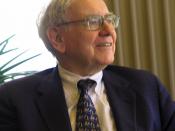Warren E. Buffet, 1995
Background
In August 25, 1995, Warren Buffet, COE of Berkshire Hathaway announced that his company would acquire the rest of the GEICO Corporation. In doing so, this would the GEICO shareholders a 26% premium per share market price, $55.75 per share to $70 per share. Buffet did not propose to change anything about GEICO, which astonished the observer since there wasn't any synergy between the two companies. At the end of the day, Berkshire Hathaway's shares were at 2.4%, a gain in market value of $718 million and the S&P500 Index was 0.05%. (Warren E. Buffet, 1995 (VA: Darden Business Publishing) pg 2 of case study.)
Warren Buffet is considered to be an anomaly, one of the wealthiest people in the world as well as respected and loved. Warren Buffet may have the best investment record in history (a compound annual increase in wealth of 28% from 1965 to 1994); (Warren E.
Buffet, 1995 (VA: Darden Business Publishing) pg 2 of case study.) Berkshire Hathaway only paid him $100,000 per year as the CEO of the company. Even though Buffet and other insiders controlled 47.9% of the company, he ran the company in the interests of all the shareholders. He remained a private individual even when he was featured in many laudatory articles and three biographies. (Warren E. Buffet, 1995 (VA: Darden Business Publishing) pg 2 of case study.)
Many writers want to extract the essential elements of Buffet's success, hoping to expose or reveal why Berkshire's acquisition of GEICO. The questions they hoped to have answered: "What are the key principles that guided Buffet? Could these be applied broadly in the late 1990s and into the 21st century, or were they unique to Buffet and his time? Under what assumptions would this...


